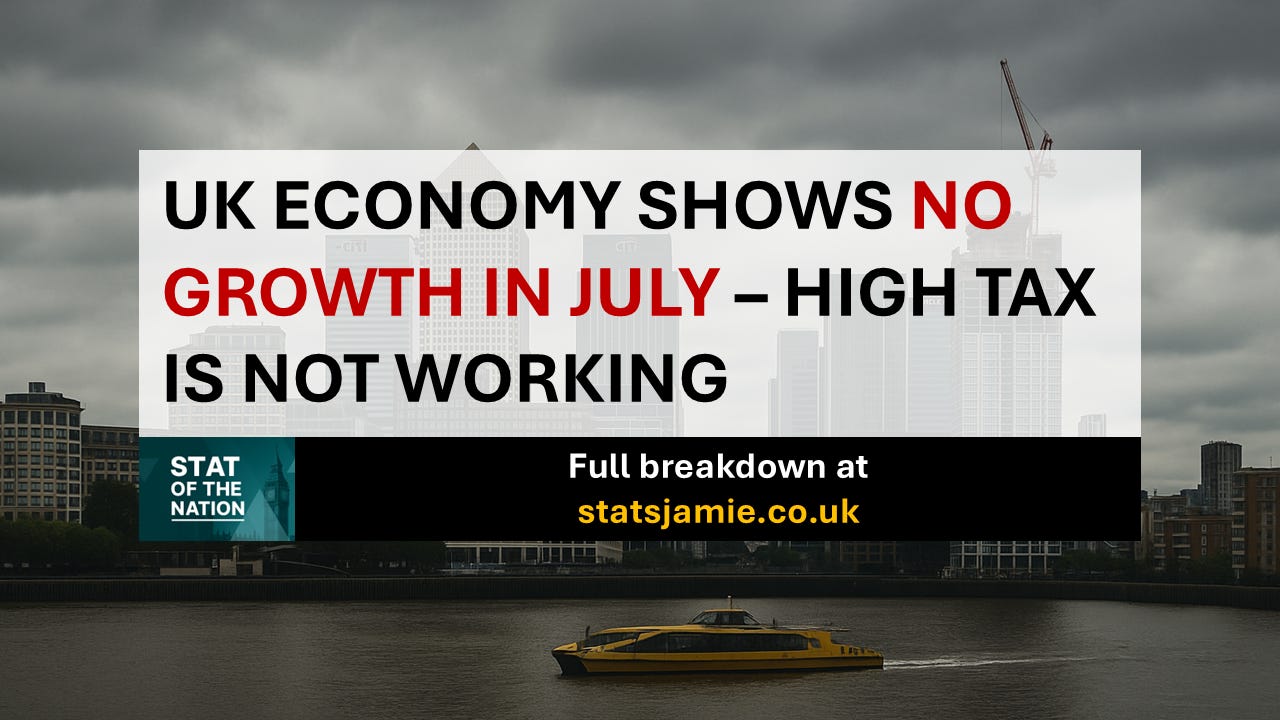UK economy shows no growth in July — high tax is not working
Borrowing props up the figures, but the private sector is in retreat.
The latest figures from the ONS confirm what many of us feared: the UK economy flatlined in July 2025. The official figure was 0.0%, but in truth the economy actually slipped -0.04%. Only rounding made it look flat.
This comes after a weak spring: April fell -0.1%, May fell -0.09%, and only June showed a modest +0.35% bounce. Strip out that single good month, and the economy has been stagnating for much of this year. The ONS said the latest figures showed the economy had “continued to slow” over the past three months.
On a rolling three-month basis, growth slowed again to +0.2%. Momentum is fading, not building.
What’s behind the July figures
The picture underneath the headline is even starker:
Manufacturing fell, dragging the production sector down.
Services grew slightly, but a factor was government spending on health and social care.
Construction edged up, though not enough to offset the wider weakness.
Without the boost from health services, the economy would have shown an outright contraction. And that growth in health is not free — it is being funded through more government borrowing, adding to the UK’s debt mountain.
Retail sales send the same warning
The quantity of goods bought (volume) in retail sales fell by 0.6% in the three months to July 2025 compared with the three months to April 2025. This decline follows four consecutive periods of growth — a sign that household demand is now weakening again.
Why high tax chokes the economy
The Government argues higher taxes are “necessary” to balance the books. In reality, they are choking growth. Here’s why:
Corporation tax hikes deter investment. It was Rishi Sunak who raised the rate from 19% to 25% when he was Chancellor. Liz Truss briefly tried to reverse the rise, but her plans were scrapped. Labour has now locked in the higher rate — leaving Britain less competitive than many peers. Businesses are choosing to expand elsewhere, cutting jobs and investment here at home.
Wealth is leaving Britain. We’ve already seen high-profile examples of entrepreneurs and investors moving their money — and themselves — overseas to escape Labour’s tax raids. That means lost jobs, lost innovation, and lost revenue for the Treasury.
Disposable income is squeezed by stealth. While headline income tax hasn’t risen, households are being dragged into higher tax bands through fiscal drag. Frozen thresholds mean more workers paying more tax without real increases in take-home pay.
Government revenue doesn’t improve. If businesses cut investment and wealthy taxpayers leave, the Treasury collects less, not more. A shrinking private sector means fewer people in work, lower productivity, and ultimately a smaller tax base.
Consumer-facing services are struggling, manufacturing is in decline, and business investment has fallen. The small amount of growth we are seeing is being propped up by public-sector spending funded through borrowing. That is not sustainable.
Since the election, we’ve had 5 months of negative growth out of 13 and lost 157,000 payroll jobs — the private sector being hit hardest. National Insurance hikes and corporation tax increases are reducing investment, cutting jobs, and choking recovery. If the government wasn’t pumping borrowed money into the economy, the July GDP figures would be worse. But every pound borrowed today just adds to the UK’s already record-high debt mountain.
The trap Rachel Reeves has built
The Chancellor has announced her next budget on 26 November. Is she hoping for an economic miracle to appear in the data before? With the tax burden already at record highs, the ONS shows an economy running on fumes.
All the metrics are moving the wrong way:
Growth flat (actually slightly negative).
Payroll jobs down.
Inflation higher than Germany and France.
Conclusion
The Government promised growth. What we’ve got instead is stagnation, squeezed households, and businesses retreating.
High tax is not working. Unless policy shifts toward encouraging private-sector growth, investment, and productivity, the UK will limp along with flat GDP, higher debt, and worsening living standards.
✍️ Thanks for reading Stat of the Nation. If you find these stats and insights useful, please share or subscribe to support my analysis.
I crunch the numbers so you don’t have to.
📲 Follow me here for more daily updates:



